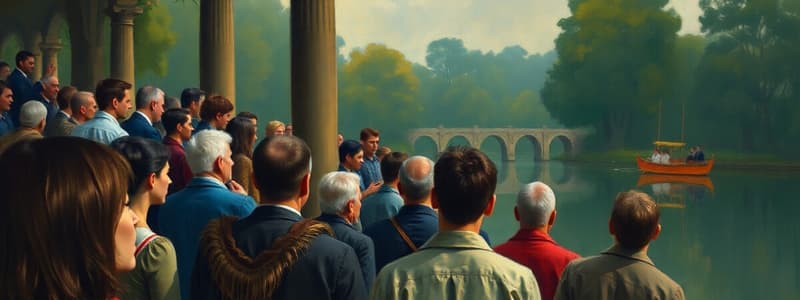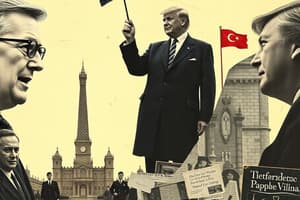Podcast
Questions and Answers
Which of the following is a term for a system where the winner of an election receives all of the votes, even if they didn't win by a majority?
Which of the following is a term for a system where the winner of an election receives all of the votes, even if they didn't win by a majority?
- First-past-the-post system
- Winner-take-all system (correct)
- Proportional representation
- Plurality system
Which of the following is the name of a legal case that allowed corporations and unions to spend unlimited amounts of money on political campaigns?
Which of the following is the name of a legal case that allowed corporations and unions to spend unlimited amounts of money on political campaigns?
- Citizens United v. FEC (correct)
- Bush v. Gore
- Roe v. Wade
- Brown v. Board of Education
Which of the following is NOT a role of the mass media in politics?
Which of the following is NOT a role of the mass media in politics?
- Gatekeeping
- Lobbying (correct)
- Scorekeeping
- Agenda setting
What is the name of the process where political parties officially choose their candidates for an upcoming election?
What is the name of the process where political parties officially choose their candidates for an upcoming election?
What is the name given to the practice of voting for all the candidates of a single political party?
What is the name given to the practice of voting for all the candidates of a single political party?
Which of the following is NOT a key element of political culture?
Which of the following is NOT a key element of political culture?
The term 'political socialization' refers to the process by which individuals develop their political beliefs and values.
The term 'political socialization' refers to the process by which individuals develop their political beliefs and values.
Which of the following is a type of survey that is designed to influence public opinion rather than measure it?
Which of the following is a type of survey that is designed to influence public opinion rather than measure it?
What is the name of the theory that suggests that elected officials feel obligated to carry out the wishes of their constituents based on the results of an election?
What is the name of the theory that suggests that elected officials feel obligated to carry out the wishes of their constituents based on the results of an election?
What is the name of the method used to select a smaller group of individuals to represent the larger population in a survey?
What is the name of the method used to select a smaller group of individuals to represent the larger population in a survey?
What is the term for the difference between the results of a survey and the actual opinions of the entire population?
What is the term for the difference between the results of a survey and the actual opinions of the entire population?
Which of the following is NOT a hallmark of a scientific poll?
Which of the following is NOT a hallmark of a scientific poll?
A public opinion poll that measures the likelihood of voters supporting a particular candidate is an example of which type of poll?
A public opinion poll that measures the likelihood of voters supporting a particular candidate is an example of which type of poll?
Which of the following is a major function of political parties?
Which of the following is a major function of political parties?
What is the term for the process of forming a political party platform that outlines the party's core beliefs and policy positions?
What is the term for the process of forming a political party platform that outlines the party's core beliefs and policy positions?
What is the name of the practice where voters cast ballots for all of the candidates of a single party, regardless of their individual merits?
What is the name of the practice where voters cast ballots for all of the candidates of a single party, regardless of their individual merits?
The concept of 'political dealignment' refers to a weakening of affiliation with a political party among the electorate.
The concept of 'political dealignment' refers to a weakening of affiliation with a political party among the electorate.
A political action committee (PAC) is a type of organization that is created specifically to raise money for the campaigns of political candidates or parties.
A political action committee (PAC) is a type of organization that is created specifically to raise money for the campaigns of political candidates or parties.
In which of the following types of elections do voters choose their party's nominee for a general election?
In which of the following types of elections do voters choose their party's nominee for a general election?
A referendum is a type of election where voters decide whether or not to overturn a decision made by the government.
A referendum is a type of election where voters decide whether or not to overturn a decision made by the government.
What is the name of the political strategy where a candidate focuses on highlighting the perceived shortcomings of their opponent rather than promoting their own accomplishments?
What is the name of the political strategy where a candidate focuses on highlighting the perceived shortcomings of their opponent rather than promoting their own accomplishments?
The term 'frontloading' refers to the tendency of states to schedule their primary elections earlier in the election calendar.
The term 'frontloading' refers to the tendency of states to schedule their primary elections earlier in the election calendar.
Which of the following is NOT a major role of interest groups in the political process?
Which of the following is NOT a major role of interest groups in the political process?
The term 'iron triangle' refers to a close relationship between interest groups, government agencies, and Congressional committees.
The term 'iron triangle' refers to a close relationship between interest groups, government agencies, and Congressional committees.
Grassroots lobbying is a type of lobbying that relies on the mobilization of ordinary citizens to influence political decisions.
Grassroots lobbying is a type of lobbying that relies on the mobilization of ordinary citizens to influence political decisions.
Which of the following is a common criticism of the Electoral College?
Which of the following is a common criticism of the Electoral College?
Which of the following is an example of an unconventional form of political participation?
Which of the following is an example of an unconventional form of political participation?
What is the term for the right to vote, also known as suffrage?
What is the term for the right to vote, also known as suffrage?
Which of the following Constitutional Amendments granted the right to vote to 18-year-olds?
Which of the following Constitutional Amendments granted the right to vote to 18-year-olds?
A 'trial balloon' is a strategy used by politicians to gauge public reaction to a potential policy or idea before formally proposing it.
A 'trial balloon' is a strategy used by politicians to gauge public reaction to a potential policy or idea before formally proposing it.
The term 'sound bite' refers to a brief, memorable quote or sound clip that is used in news media reporting to capture a politician's message.
The term 'sound bite' refers to a brief, memorable quote or sound clip that is used in news media reporting to capture a politician's message.
The 'watchdog role' refers to the media's responsibility to investigate government misconduct and expose wrongdoing.
The 'watchdog role' refers to the media's responsibility to investigate government misconduct and expose wrongdoing.
The term 'spin' refers to the practice of manipulating or interpreting information in a way that favors a particular perspective.
The term 'spin' refers to the practice of manipulating or interpreting information in a way that favors a particular perspective.
Which of the following refers to the tendency of news outlets to focus on the perceived competitive aspect of a political campaign, often emphasizing the horse-race aspect of the election?
Which of the following refers to the tendency of news outlets to focus on the perceived competitive aspect of a political campaign, often emphasizing the horse-race aspect of the election?
Flashcards
Conservative
Conservative
A person who generally believes that a society should be governed by principles and values that have historically proven themselves through time.
Demographics
Demographics
Statistical data relating to the population and particular groups within it.
Exit polls
Exit polls
Polls taken as voters leave polling places to gather information on their voting decisions.
Liberal
Liberal
Signup and view all the flashcards
Libertarian
Libertarian
Signup and view all the flashcards
Margin of error
Margin of error
Signup and view all the flashcards
Moderate
Moderate
Signup and view all the flashcards
Political ideology
Political ideology
Signup and view all the flashcards
Public opinion
Public opinion
Signup and view all the flashcards
Political Culture
Political Culture
Signup and view all the flashcards
Political socialization
Political socialization
Signup and view all the flashcards
Political Party
Political Party
Signup and view all the flashcards
Party Realignment
Party Realignment
Signup and view all the flashcards
Mass Media
Mass Media
Signup and view all the flashcards
Media Bias
Media Bias
Signup and view all the flashcards
Agenda Setting
Agenda Setting
Signup and view all the flashcards
Sound Bite
Sound Bite
Signup and view all the flashcards
Study Notes
US Government Unit 2 Reading Guide: Linkage Institutions
-
Public Opinion (Chapter 10):
- Concepts: Conservative, Demographics, Liberal, Exit polls, Libertarian, Margin of error, Moderate, Political ideology, Political culture, Polling universe, Political socialization, Public opinion, Push polls, Random sampling, Sample, Sampling error, Straw polls
- Measurement: Scientific polls, public opinion, sample, random sample, bias, credibility
- Political Ideologies: Liberals, moderates, conservatives, and libertarians differ in their beliefs about social and economic policy and policymaking
- Role of Government: Core beliefs and values influence political attitudes and socialization; political culture influences public policy formation, goals, and implementation over time.
-
Political Parties (Chapter 11):
- Concepts: Critical elections, Delegate, Partisan/political polarization, Minor/third parties, National party platform, Party convention, Party dealignment, Party realignment, Political party, Proportional representation, Winner-take-all system
- Structure and Organization: Parties' structure, roles of parties, parties' involvement in the electorate and in government, coalitions of parties in America, partisan polarization today, Characteristics and history of the US two-party system(e.g., Party Development (1798-1800), Democratic Domination (1800-1860), Republican Domination (1860-1932), Return of the Democrats-New Deal Era (1932–1968), Divided Government (1968–Present), Role of minor parties and barriers to minor party success
- Policymaking Process: Role of political parties in the policymaking process
-
Campaigns, Elections & Voting (Chapter 12):
- Concepts: Citizens United v. FEC, Caucus, Closed primary, Dark money, Electoral College, Electorate, Federal Election Campaign Act (FECA), Federal Election Commission (FEC), Frontloading, General election, Incumbency, Independent expenditures, Initiative petition/ballot initiative, Mandate theory of elections, Midterm election, Nomination, Off-year election, Open primary, Party-line voting, Plurality, Precinct, Primary election, Political Action Committees (PAC), Political participation, Primary election, Retrospective voting/judgment, Recall election, Referendum, Suffrage (franchise), Super PAC, Swing states
- Types of Elections: Primary elections, caucuses, general elections (Presidential, mid-term, off-year), referendums, ballot initiatives
- Campaign Organizations and Strategies: Campaign organizations and strategies affect election process, major laws/Supreme Court cases impacting campaign finance
- Electoral College: Role, effects, and criticisms
- Forms of Participation: Conventional and unconventional political participation; influence of various actors
-
Interest Groups (Chapter 14):
- Concepts: Ticket splitting/split-ticket voting, Voter behavior, Voter mobilization, Voter registration, Voter turnout, Free rider problem, Lobbying, Public-interest group, Trade association, Electioneering, Grassroots lobbying, Interest group, Revolving door, Selective benefits, Single-issue groups
- Interest Group Influence: Activities, influence on elections and policymaking, iron triangles, issue networks, inequality of resources, free-rider problem, PACs roles in elections and policymaking
-
News Media (Chapter 13):
- Concepts: Agenda setting (gatekeeper role), Equal Time Rule, Mass media, Narrowcasting, Press conference, Leak, Media bias, Scorekeeper role, Sound bite, Spin, Trial balloon, Watchdog role
- Role in US Politics: Informing the public, shaping public opinion, linking citizens to the government (watchdog, gatekeeper, and scorekeeper roles)
- Media and Communication Outlets: Diversity of choices and their influence on political institutions and behavior, influence of government and politics on the media
- Public Opinion Measurement: Scientific polls, public opinion, sample, random sample, bias, credibility
Studying That Suits You
Use AI to generate personalized quizzes and flashcards to suit your learning preferences.
Related Documents
Description
Explore the key concepts of public opinion and political parties in the context of the U.S. government. This quiz focuses on understanding political ideologies and the role of government in shaping public policy. Test your knowledge on polling mechanisms, party platforms, and the influence of demographics on political attitudes.




